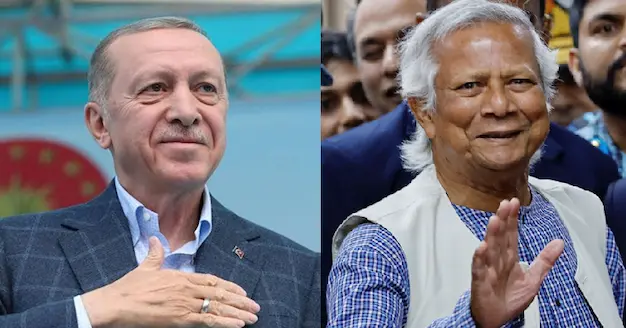
Turkey-Bangladesh - Turkey’s growing influence in Bangladesh through defense deals, ideological support, and Islamist networks is reshaping South Asia’s power dynamics
Turkey’s Strategic Embrace of Bangladesh, From Defense Deals to Ideological Outreach
Turkey-Bangladesh – In a dramatic shift in South Asian geopolitics, Turkey has begun to assert its influence in Bangladesh, a move that many analysts interpret as part of a broader anti-India strategy. Under President Recep Tayyip Erdoğan, Ankara has paired its military-industrial ambitions with pan-Islamist ideology, forging new alliances that challenge India’s regional dominance.
Following the ouster of Prime Minister Sheikh Hasina in August 2024, Bangladesh’s interim government led by Muhammad Yunus has opened the door to Turkish engagement. This includes:
- Defense-industrial cooperation: Turkey is helping Bangladesh establish two defense zones in Chittagong and Narayanganj.
- Military hardware exports: Bangladesh has inducted Turkish TRG-300 rocket systems and Bayraktar TB2 drones into active service.
- Technology transfer and training: Turkish defense officials are facilitating visits by Bangladeshi military and Islamist leaders to arms manufacturing facilities.
These developments mark Turkey’s first substantive hard-power play in India’s eastern neighbourhood, a region previously untouched by Ankara’s strategic ambitions.
Islamist Networks and Ideological Convergence, A Hybrid Threat Emerges
Beyond defense, Turkey’s influence in Bangladesh is increasingly ideological. Reports suggest Turkish intelligence agencies are backing radical Islamist groups like Jamaat-e-Islami, providing financial and logistical support. This includes:
- Renovation of Jamaat offices in Dhaka allegedly funded by Turkish-linked entities
- Facilitation of visits by Islamist leaders to Turkish arms factories
- Support for student activists aligned with extremist ideologies
Under the Yunus regime, previously banned groups such as Hizb ut-Tahrir and Ansarullah Bangla Team have resurfaced, with some forming militias like the “Islamic Revolutionary Army”. Violence against minorities has surged, and Islamist rallies demanding a caliphate have become more frequent.
India’s intelligence agencies are alarmed by this convergence of religious soft power and technological hard power, which could destabilize its eastern borders and embolden extremist elements within the region.
Why India Should Be Worried, Strategic, Security, and Diplomatic Implications
Turkey’s growing footprint in Bangladesh poses a multi-dimensional threat to India:
- Strategic encirclement: Turkey is aligning with Pakistan and Bangladesh, forming a triangle of influence that could challenge India’s eastern and western flanks simultaneously.
- Drone diplomacy: Turkish drones have reportedly flown near the India-Bangladesh border, raising concerns about surveillance and potential provocations.
- Defense realignment: Bangladesh’s acquisition of Turkish tanks and drones, coupled with military training from Pakistan, signals a shift away from India-centric defense partnerships.
- Economic and diplomatic erosion: Turkey has openly stated its intent to replace India in Bangladesh’s import markets, further weakening New Delhi’s influence.
India’s response must be swift and strategic. This includes:
- Strengthening ties with counterbalancing nations like Greece, Cyprus, and Armenia
- Enhancing surveillance and defense infrastructure along the eastern border
- Engaging diplomatically with Bangladesh to counter radicalization and restore bilateral trust
Final Thought:
Turkey’s assertive push into Bangladesh is not just a regional manoeuvre, it’s a calculated geopolitical gambit that blends ideology, defense, and diplomacy. For India, the challenge is no longer theoretical. It’s unfolding in real time, demanding a recalibrated security doctrine and a renewed focus on its eastern frontier.
Stay updated with the latest news on Rapido Updates. Keep yourself updated with The World, India News, Entertainment, Market, Automobile, Gadgets, Sports, and many more
1 thought on “Turkey-Bangladesh Strategic Grip : A Rising Islamist Axis Threatening India’s Eastern Flank”